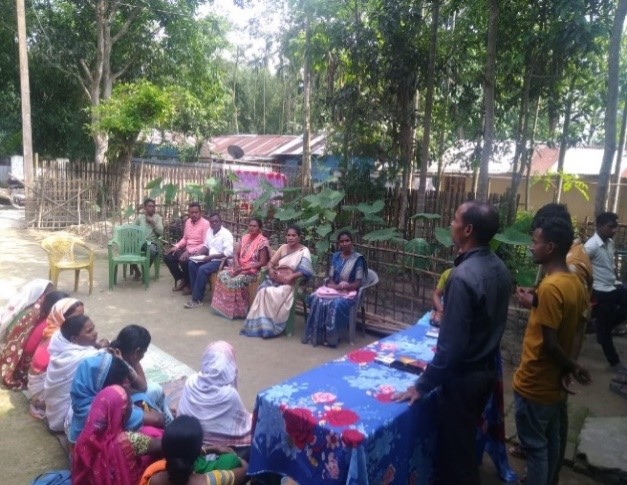
A Digital Sammbad (Digital Dialogue) was organized in 20 project areas under the Internet Roshni project in Dibrugarh and Jorhat districts of Assam on the occasion of Labour Day. The programme was organized by the SoochnaPreneurs, facilitated by the respective district coordinators.
Since the Adivasi communities residing in tea gardens don’t have access to proper digital tools and the Internet, this Digital Sammbad was an effort to bring out their views and thoughts regarding the uses and benefits of Internet and digital services. The SoochnaPreneurs of each of the 20 centers gathered 10-15 community leaders and representatives and discussed with them about the issues that they have been facing in terms of accessing the digital and Internet related services and facilities. The participants shared the difficulty faced by the community at large to avail the digital services inside their garden. Since they follow a strict work regime it is almost impossible to take off from their work and go out to the garden to avail these services. They also expressed that they hardly get to know about the government schemes and entitlements. They come to know about it only when somebody comes and tells them. There is no place in the garden where they can go and enquire about the schemes and entitlements and most of the time even if they come to know about such schemes or benefits they are unable to avail it because of the work restrictions. They expressed that a one stop information center is very much needed inside the gardens, where all the schemes and benefits would be displayed and which can be accessed at any time by the community.
The Soochnapreneurs then introduced them to the project Internet Roshni. They explained to them how the community will be benefited through this project in their respective gardens. The SPs then shared how the community can have improved access to Internet connectivity through enhanced mobile data networks through the Community Internet Libraries that will be set up inside the gardens and in locations easily accessible by the community. It was also shared among the participants that this project will also digitally empower the community by providing basic Internet skills and how it will improve and enable access to government schemes, information and entitlements digitally. Not only this, these CILs will be the single point of contact for the community to cater to their needs be it availing the online services, place to discuss the issues of the garden, knowledge hub for the children and students, Internet hot spot area and in many other ways to help the community grow digitally and holistically.
In the end the participants were happy to hear about the project and they even added that all possible help and support will be given from the community in order to implement the activities of the project.









